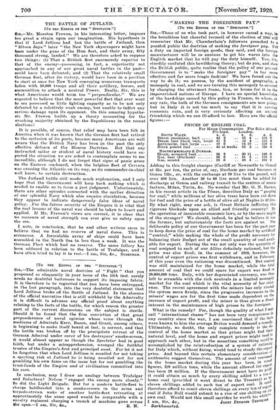[To THE EDITOR OF THE " SPECl/TOR."] Sra,—The admirable naval
doctrine of " Fight " that you propound so eloquently in your issue of the 19th inst. surely needs no doubtful buttresses to support its imposing fabric. It is therefore to be regretted that you have been entrapped. in the last paragraph, into the very doubtful statement that Lord Jellicoe broke off the Battle of Jutland. In the absence of the official narrative that is still withheld by the Admiralty it is difficult to advance any official proof about anything relating to the facts of the battle, for which reason the greater part of the current discussions on the subject is sterile. Should it be found that the firm conviction of that great preponderance of naval opinion whose voice through the mediums of Admirals Kerr, Bacon, and Grant, among others, is beginning to make itself heard at last, is correct, and that the battle was broken off by the precipitate retreat of the German Admiral under cover of his destroyers' smoke-screen, it would almost appear as though the Spectator had in good faith, but under a misapprehension, wronged the faithful trustee of the Empire's first and principal asset. For let it not be forgotten that when Lord Jellicoe is assailed for not taking a sporting risk at Jutland he is being assailed not for not gambling his own fame on the issue but for not gambling the trust-funds of the Empire and of civilization committed into his care.
In conclusion, may I draw an analogy between Trafalgar and Balaclava? Nelson "engaged the enemy more closely." So did the Light Brigade. But for a modern battle-fleet to charge baldheaded into a smoke-screen in the mine and torpedo-strewn wake of another battle-fleet retreating at approximately the same speed would be comparable with a cavalry regiment charging a trench of machine guns across






































 Previous page
Previous page